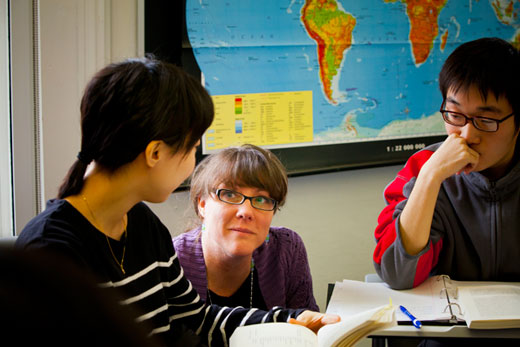After observing years of rapid changes among America's liberal arts programs, Emory Provost Earl Lewis believes it's time for the University to take the lead, calling for a dramatic new examination of the future of liberal arts.
Lewis has appointed a Commission on the Liberal Arts, charging it to take a broad, deep look at liberal arts at Emory over the next quarter century and plan for that future today — a provocative, in-depth exercise in which all aspects of the liberal arts experience are on the table for evaluation.
The 28-member commission, comprised of faculty, staff, students, alumni and trustees, is being urged to tackle questions that challenge some of the most basic assumptions about the liberal arts experience, from degrees and alliances to what should constitute the very core of a liberal arts education.
Should Emory offer new degrees? Are departments, programs or some other structure the best way to organize learning in the future? What about a year-long academic calendar? Radical though it may sound, it's all fair game for discussion, Lewis insists.
"How do we begin to define the liberal arts at Emory 25 years from now?" Lewis asks. "Who should be at the table? Who really owns the liberal arts? What are the liberal arts? These are the kinds of questions that we need to begin to wrestle with."
"In undertaking such an effort we must be willing to examine all of our practices, policies, assumptions and preferences," he adds. "Invariably, this will make some more uncomfortable than others. But here is a moment for Emory to lead."
Charting a course for the future
Though Lewis acknowledges the topic isn't new, pressure to reconsider the future of liberal arts is mounting. Critics now scrutinize the cost, accountability and relevance of higher education as never before.
From the rise of for-profit colleges — now 10 percent of the higher education market, and growing — to technical training that promises jobs upon graduation, competition poses a fierce challenge to the traditional liberal arts model that embraces critical studies, creative thinking and complex and interdisciplinary inquiry.
Enrollment trends are showing the strain. Since the end of World War II, the percentage of students attending American liberal arts colleges has fallen steadily — from 25 percent in 1950 to a mere 3 percent by 2010.
At the same time, individuals receiving BAs in the arts and sciences — which accounted for 47 percent of all graduates in 1968 — has declined. "By 2010, 34 percent of all BAs earned nationwide were in liberal arts," Lewis says. "The number of students is dropping noticeably."
However, enrollment trends stand in sharp contrast to demands of the current job market, where employers still show a healthy appetite for the breadth of knowledge and skills inherent in a liberal arts education.
Claire Sterk, senior vice provost for academic affairs and Charles Howard Candler professor of public health, and Steve Everett, assistant vice provost for academic affairs, director of the Center for Faculty Development and Excellence and professor of music, who will co-chair Emory's Liberal Arts Commission, acknowledge that the issue is timely, the exercise in self-examination important.
"I think society is trying to figure out the role of higher education in general, particularly at research universities," Sterk says. "We can let the world take over and have them determine what is our destiny, or take it in our own hands."
Conversation will reach the larger community
The Commission of Liberal Arts will be given 18 months to imagine the future of liberal arts at Emory and produce a "solid set of recommendations" to help define it. "In the provost's mind, it will be a failed project if the recommendations are that we don't change anything," Everett says.
The commission will meet in early March to discuss structure, function and the creation of sub-committees. "It will be helpful to have people focus, at least initially, on the topics they are really interested in and where they feel vested," Sterk says.
To engage the larger community, Sterk and Everett hope to draw other campus groups into the conversation as well, with plans to create a web page devoted to charting their progress and to distribute regular reports of the commission's work.
"We want to make sure that, within the community, people who aren't directly involved in these discussions are at least aware of what's happening, because there will be a lot of outside interest," Everett says.
Lewis says he's been delighted by the "excited and sober reaction" of commission members who've agreed to lead the effort. And he's confident the community is prepared "to balance the tensions between continuity and change" in order to produce an outcome with lasting value.
Emory Student Government President Adam McCall, who serves on the commission as a student representative, says he looks forward to confronting difficult questions during the far-reaching exploration.
"To me, that's what the liberal arts experience is all about — challenging your preconceived notions of what it's been to find something better than before," McCall says. "My hope is that's what this commission will wind up doing."

